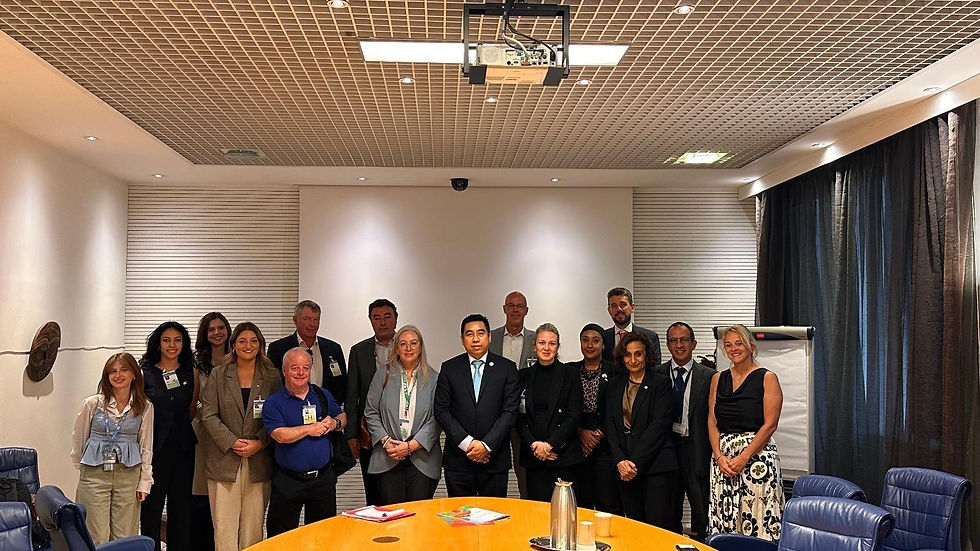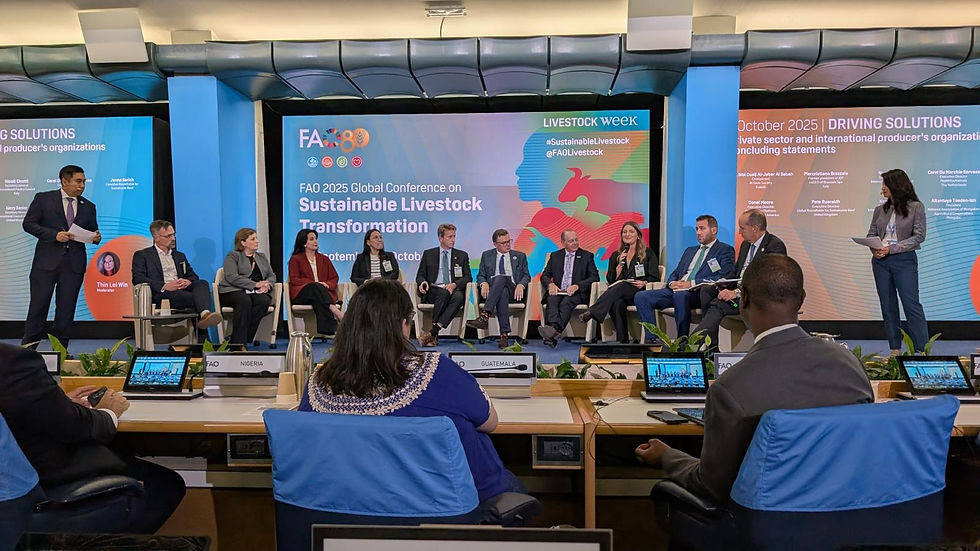Canadian Cattle Association Participates in the First United Nations Food and Agriculture Organization Livestock Week
- CCA

- Oct 2, 2025
- 3 min read

The Canadian Cattle Association (CCA) was pleased to be among the global leadership participating in the very first Livestock Week at the United Nations (UN) Food and Agriculture Organization (FAO) Headquarters in Rome, Italy.
The event included the second FAO Sustainable Livestock Transformation Conference on September 29–October 1, 2025, where attendees included:
Bob Lowe, Past President of the Canadian Cattle Association, attending as President of the Global Roundtable for Sustainable Beef (GRSB)
Jessica Radau with the Canadian Cattle Association
Jenna Sarich, with the Canadian Roundtable for Sustainable Beef (CRSB) attending as a Nuffield Canada Scholar
Beatriz Montenegro, attending through the Canadian Cattle Young Leaders Program
From speaking engagements to strategic meetings and connections, it was a productive conference sharing Canadian beef’s commitment to sustainability. The conference spotlighted the livestock sector as part of environmental sustainability and global food security solutions, and the important role of animal-based foods on the plate as part of a healthy diet. We are proud of the Canadian beef industry’s contributions to climate and food security solutions, with notable sustainability advancements and achievements to date.
For example, CCA was able to highlight the beef sector’s bold, industry-led 2030 goals during the conference. These goals include reducing primary production greenhouse gas (GHG) emissions intensity by 33 per cent and maintaining Canada’s 35 million acres of native grasslands—the majority of which is in the care of beef producers. Progress has already been seen through the Canadian beef industry’s life cycle assessment, evidenced by a 15 per cent reduction in GHG emissions per kilogram of beef produced between 2014 and 2021 (CRSB NBSA, 2024a; Aboagye et al. 2024). Beef is also an efficient, concentrated and nutritious protein source, containing a variety of vitamins and minerals such as iron, zinc, vitamin B6 and vitamin B12—nutrients that are lacking in the diets of many Canadians.

CCA’s FAO Sustainable Livestock Transformation Conference highlights include:
Canadian representatives met with the FAO Animal Division leadership to discuss Canada’s continued advancements in sustainable livestock practices.
Meeting with the Chair of the FAO Sub-Committee on Livestock, Dónal Coleman, to learn about the upcoming development of FAO’s Global Plan of Action for Sustainable Livestock Transformation.
Jenna Sarich was invited to speak in the conference closing panel to reflect on event outcomes and highlight Canadian beef’s sustainability story alongside global farm organization leaders, such as GRSB’s Executive Director, Ruaraidh Petre.
Bob Lowe participated in the conference “Speaker’s Corner” to share a Canadian beef producer’s perspective on the role of cattle in conserving Canada’s grasslands ahead of the 2026 International Year of Rangelands and Pastoralists.
CCA co-hosted a side event alongside the Animal Task Force and World Farmers’ Organization on the role of youth leadership in the livestock sector, featuring Jenna Sarich who spoke about the National Beef Sustainability Assessment.
Beatriz Montenegro presented in the “Speaker’s Corner” sessions to highlight the CCA’s Canadian Cattle Young Leaders Mentorship Program as one of more than 200 program graduates since established in 2010.
FAO report highlights of interest to livestock sustainability:
A 2023 FAO report on the contribution of terrestrial animal source food to healthy diets states meat, eggs and milk offer crucial sources of much-needed essential nutrients which cannot easily be obtained from plant-based foods.
The FAO’s 2023 Pathways towards lower emissions report found that meaningful greenhouse gas reductions from the livestock sector will come from improvements in efficiency (specifically in animal production, adoption of known feed and nutrition practices, and improving animal health and welfare). If the global livestock sector follows FAO’s suggested pathway to decrease emissions, the estimated total reduction in livestock-related emissions would be 78 per cent. Conversely, making changes to decrease consumption of terrestrial animal sourced foods would only lead to a 4 per cent emissions reduction.
A study from FAO researchers indicated 86 per cent of global livestock feed is not suitable for human consumption, reinforcing the role of livestock in converting resources that could otherwise be wasted into a nutrient-dense protein like beef.
The CCA looks forward to continued engagement in these important discussions that will shape the future of livestock sustainability globally and nationally.









Comments